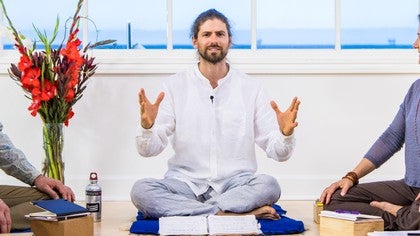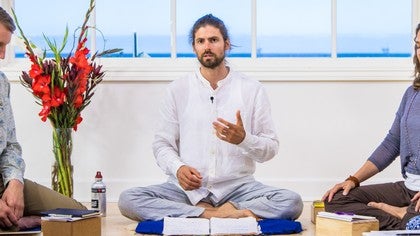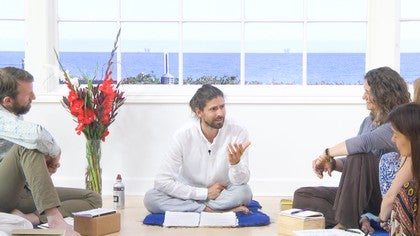Description
About This Video
Transcript
Read Full Transcript
So now we come to the 67th verse in which Krishna gives a very memorable image and it's one that is particularly memorable to me because I have a friend who is a sailor, a skipper, and this verse talks about, uses the image of a boat on the water in wind. A boat without a skipper on the water, the wind will just take it any direction, yes? And so Krishna says, if you let your senses run the show, basically you'll be like a boat in wind on the water with no pilot. And so he's inviting us to be the pilot, to be the skipper. So here's what he says.
So Krishna says, yan, yat, manaha, one whose mind charatam moves, indriyana, of the senses, anuvidhiyate, under their kind of rule. So one who lets him or herself be ruled by the passing whims and fancies of the senses, that person's prajya, tarasya prajyaam, haraate, gets carried away, gets taken away, vayurnav mivambasi, like a boat in wind on the water. And this is so true, yes? And so again, so beautifully, Krishna describes with a vivid and very real telling image, something that we can recognize perhaps in our own lives. Sometimes yeah, we have felt carried away, we've kind of lost our orientation, we've lost our compass, because we've let ourselves be ruled not by our deeper sense of judgment or discrimination, but by the passing whims and fancies of the senses.
So this is very real. But at the same time, Krishna is almost inciting us and certainly encouraging us to actually do something about it, like a boat in wind on the water, so what's the suggestion? So take responsibility for the way you interact with the wind. Take responsibility for the way you interact with the forces of nature. Your senses are going to take you into all sorts of different situations, but you can determine how you navigate them.
When you're on a journey, you'll encounter many different currents, many different winds. So learn to be a skipper, learn to be the captain of your own ship, and take responsibility for how your journey feels and the way you interact with what you experience. So I think one of the reasons this verse is so memorable for me is that I have a friend who is a skipper. And one time I was teaching in Bangkok, and this guy had decided, basically his work, he would take people on cruises, on his sailboat, in generally usually very beautiful parts of the world, and he would do this for about half of the year. And the other half of the year, he's called Loik.
Loik would then go and study something he was interested in. And this particular year, he came to Thailand, and he'd found this yoga studio where he was really happy with the teachers and the approach, and so he was spending about half of his time there, cultivating his understanding of yoga as another practice of yoga posture and various allied practices, as a means to come to steadiness and happiness in his life. And Loik was loving it, but only two or three weeks in, this was before I met him, Loik injured his wrist, and in the style of yoga that was taught in this studio, often many postures would be using your hands to support your body weight on the ground. And one day, the story goes, Loik was sitting there in the entrance to the yoga studio, looking terribly forlorn. And Mia, another lady who was a regular student there, she said, hey Loik, you all right?
And he's like, oh, well, I've planned all this time, and I was really enjoying all the work I'm doing here so much, but now I've hurt my wrist, and I feel like I can't go to class anymore. I don't know what I'm going to do with my time. Now Mia, at that time, she'd been having some struggles of her own with carpal tunnel syndrome. She was working a lot on a keyboard in her job, and a few weeks prior to this, she had approached me to ask if we could do a no-hands yoga class, because I used to teach this regular kind of weekly workshop class, but we always had a different theme. So I said, sure, we'll do it.
And so Mia had learned many techniques and modifications that she could use to go to the regular classes and avoid putting the weight on her wrists if it was too painful or wasn't appropriate for her that day. So there were variations on the forearms, there were all sorts of things that would avoid putting the wrist in a place that it wasn't happy. So Mia says to like, oh, don't worry, no problem, just go to James's class, and it'll give you some alternatives. And like, he had his regular schedule, and I wasn't fitting into it at that point, but he saw that there was a class that I was, it was a beginner's class, and Mia said, oh, no, no, he goes to the foundation class, very good. So he came along, and he explained that I had this wrist injury, and that Mia, who, she said, oh, you tell him that I sent you.
And Mia had been coming to class, I knew her quite well. She was, and her husband, they were good friends of mine, and they'd both been coming to classes for at least a couple of years. And so he said, oh, Mia sent me here, and I have this wrist, and he said, yeah, yeah, I'll give you some variations, no problem. And at the end of the class, Loik rose up out of Shavas, another final relaxation posture in which if it was lying quiet on the ground, he kind of leapt up, and he says, it's just like my boat. And I said, Loik, what do you mean?
It's just like my boat. I said, I don't understand. He said, oh, yeah, well, you see, I was so upset, I was so annoyed that I'd hurt myself because I thought that you had to do the yoga practice in a particular way. I thought you always had to do this posture and then this posture, and you had to put the hand here. And now I understand you don't need to do it just like that.
You can actually do it in a different way. It's just like my boat, you see. He says, go on. He says, well, on a boat, you see, a boat is like a system. There are rules about, say, for example, the wind changes, it gets much stronger.
You take this sail down first before you take that one now, and this helps you work efficiently with the wind. And when conditions change, there's kind of protocol, there's a rule, there's a way of operating that helps you stay safe, that helps you stay efficient, and that helps you keep on course. There are lots of rules about how you manage your boat. He said, when I was a young skipper, and I was a little bit nervous about taking people halfway around the world, I always followed the rules. I always did everything by the book, even though I knew that I didn't need to, because what happens when there's a storm?
It's the rule book, it gets washed off the deck and it sinks to the bottom of the sea. And then you get to find out if in following the rules, you've really understood what the rules are in place to help you maintain, which is the well-being of the ship and all the people on it. He says, really, now I don't follow the rules because I know what they're for, so I dance with my ship. Sometimes the best thing for me to do is to improvise a little, because I know what all the rules are for. And same with yoga, the idea is we practice for the sake of harmony.
If following the rules is not cultivating harmony, it's no good. So for Loic, he's got a wrist injury. If he does the kind of classic way of executing a posture and he's harming himself, this is a yoga, the opposite of yoga. He's not doing any good at all. And the idea in yoga, yoga really doesn't work with rules.
Yoga instead lays down these very broad, inclusive, inviting principles. And yoga encourages us to recognize and remember that any rule worth its salt, to use a maritime image in this verse, any rule worth its salt will bear being broken for the sake of the principle that it's designed to protect. And so here, Krishna says, in life, you're going to basically, he doesn't say this directly, but basically in life, we can be pretty confident that sooner or later we'll have to encounter a storm. Some say that when you practice yoga, in a certain way, you're actually inviting a storm. Because if you're saying, I want peace, I want happiness, what are you also asking for?
You're asking to remove all of those tendencies which would get in the way of you experiencing peace or experiencing happiness. You're asking to dissolve the fragmenting disease-inducing tendencies that may well be harbored in you. And so when we start asking for peace and asking for wellness, if we're really set on it, it might be the case that they rise up in a storm, a storm that puts to the test our capacity to stay steady in the midst of challenge. And what's Krishna said? When you can be steady in the midst of challenge, then your Pragya becomes steadily established and then you know Prasada, true serenity.
But as he says here in the 67th, if you let yourself be kind of a victim of your sensory whims and fancies, then you'll lose your Pragya, you'll lose your discrimination. And so the idea, cultivate Pragya by claiming responsibility for the way you interact with all the different things you experience in life.
The Song of Self: Bhagavad Gita: Chapter 2
Comments

You need to be a subscriber to post a comment.
Please Log In or Create an Account to start your free trial.











